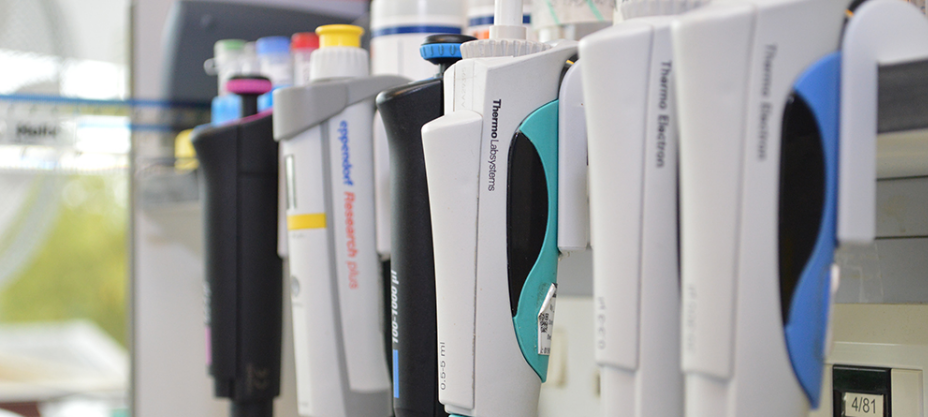This page lists available PhD projects that are funded. We also have a list of un-funded and self-funded projects here: https://www.phar.cam.ac.uk/postgraduate/abstracts
Dr Paul Miller
BBSRC-DTP iCASE studentship with AstraZeneca
Evolving natural peptide scaffolds for pharmacological tools and therapeutics
Ion channels and GPCRs are high-value drug discovery targets. However, achieving selectivity between closely related isoforms using small molecules remains challenging. Alternative antibody biologics bind a larger epitope and achieve higher specificity but have limited success in inducing desirable modulatory effects against membrane proteins with small extracellular loops. In contrast, natural toxin peptides can ensure high specificity and strong functional effects, having already proven themselves to be potent and selective modulators of ion channels and GPCRs[1,2]. However, many such peptides possess intricate arrangements of stabilising disulphide bridges which constitute a barrier to production from recombinant cell expression platforms due to disulphide scrambling causing misfolding. Chemical synthesis is used for accurate production but is slow, expensive, and inaccessible. Facile recombinant production would be a considerable advantage for broad accessibility and engineering. This project will explore a strategy to overcome this limitation. A Nav channel bait, already developed in the Miller lab, who have proven experience in membrane protein antigen production for generating protein binders, will be used to enrich for high expressing toxin peptide scaffolds expressed on yeast. The student will test peptides at Astra Zeneca (AZ) for functional effects on NaVs supported by Dr Liz Roberts, Senior Director Mechanistic Biology and Profiling. There will be the opportunity to then understand the molecular basis of actions by electron cryo-microscopy.
For more detailed project info and how to apply please see:
https://bbsrcdtp.lifesci.cam.ac.uk/available-icase-projects
Should you wish to discuss this opportunity further please contact Dr Miller (pm676@cam.ac.uk).
Dr Catherine Wilson and Professor Laura Itzhaki
AZ funded non-clinical PhD studentship (Fixed Term)
Delivering biological proximity-inducing degraders - a comparative analysis of viral, RNA and protein therapeutics
Conventional approaches to cancer drug discovery have proven incapable of tackling many key targets, hence new strategies are urgently required. Targeted Protein Degradation (TPD) is one such strategy, growing at a remarkable rate but severely constrained by the limited availability of small-molecule ligands. Biologic-based PROTACs (bioPROTACs) are especially valuable because peptide- and protein-based ligands are available for many targets that are currently intractable to a small molecule approach and can be readily engineered to create novel degraders. Our research has established key principles to drive the discovery of bioPROTACs against such targets. It is now crucial to harness the capabilities of our novel bioPROTACs as a therapeutic approach, and the development of novel delivery methods is the goal of this PhD project.
Application Process - All applications will need to be made through the University Application Portal: www.graduate.study.cam.ac.uk/courses/directory/blphpdphc/apply
Informal enquiries are welcomed and should be directed to Dr Catherine Wilson chw39@cam.ac.uk and Prof Laura Itzhaki lsi10@cam.ac.uk.
Professor Graham Ladds
AZ funded non-clinical PhD studentship
Experimental and computational framework for optimising dosing strategies to mitigate T-cell exhaustion in T-cell engager therapies
T-cell engager (TCE) therapies are increasingly prevalent in the clinical pipeline of pharmaceutical companies. While TCEs are promising therapeutic agents due to their high potency, a major pitfall is T-cell exhaustion, which reduces therapeutic effect of TCEs so preventing rapid regression of the tumor lesion. In this project you will evaluate the concept of "dosing holidays" and how they may mitigate T-cell exhaustion.
You will combine interdisciplinary approaches of extensive in-vitro experiments that quantify effector cell kinetics with translational pharmacokinetic pharmacodynamic modelling to inform, evaluate and design potential schedules to mitigate T-cell exhaustion.
Application process: Apply for a PhD in Pharmacology via the University's Applicant Portal (https://www.postgraduate.study.cam.ac.uk/courses/directory/blphpdphc/apply).
For informal enquiries, contact Prof Graham Ladds (grl30@cam.ac.uk), or Postgrad@phar.cam.ac.uk for questions about the application process.
Dr Florian Merkle
AZ funded non-clinical PhD studentship
Robust hypothalamic cellular models of neurometabolic disease
Obesity is a major global health issue with a strong genetic component that largely acts via neurons that regulate appetite, including POMC and AGRP neurons of the hypothalamus. Human induced pluripotent stem cells (iPSCs) can be differentiated into hypothalamic neurons that closely resemble their counterparts in the brain. In this project, you will work to generate hypothalamic neurons more quickly, efficiently, and reproducibly by introducing candidate transcription factors (TFs) involved in cell type specification and maturation. This project will produce insights into the biology of human neuron specification, develop deeply characterized cellular models to facilitate discovery science, and benefit from AstraZeneca-supported facilities such as the FGSL to reveal new therapeutic targets.
All applications will need to be made through the University Application Portal: www.graduate.study.cam.ac.uk/courses/directory/blphpdphc/apply
For enquiries about the project, please contact Dr. Florian Merkle (fm436@cam.ac.uk). For enquiries about the application process, please contact Postgrad@phar.cam.ac.uk.
More information can be found on our Jobs page

